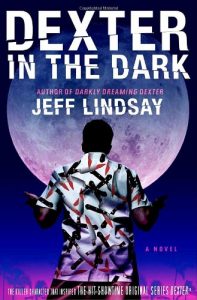 In a sense, one of the reasons I have been trying to read so many short, breezy, comfortingly familiar and above all known-quality books is that I’m girding my loins for literary battle; in other words, it’s about time for me to read another Anita Blake novel, and I’m by turns looking forward to the review and dreading the book itself. But also there are a stack of giant books I’ve been peering at, and then I think, nah, I’d rather read a lot of short books instead of that. I suppose once I finally catch up with the Ultimate Comics line from Marvel, I’ll feel better about long gaps in my books-reading too. None of which exactly explains how I pick what my next novel will be; I kind of just do it by feel, as opposed to the very structured method I have of graphic novel selection. All I really know is that my to-read pile is at least a hundred books deep right now, and that’s kind of unsustainable since it has consistently grown rather than shrunk, and so lots of authors but especially lots of series suffer delays as a result.
In a sense, one of the reasons I have been trying to read so many short, breezy, comfortingly familiar and above all known-quality books is that I’m girding my loins for literary battle; in other words, it’s about time for me to read another Anita Blake novel, and I’m by turns looking forward to the review and dreading the book itself. But also there are a stack of giant books I’ve been peering at, and then I think, nah, I’d rather read a lot of short books instead of that. I suppose once I finally catch up with the Ultimate Comics line from Marvel, I’ll feel better about long gaps in my books-reading too. None of which exactly explains how I pick what my next novel will be; I kind of just do it by feel, as opposed to the very structured method I have of graphic novel selection. All I really know is that my to-read pile is at least a hundred books deep right now, and that’s kind of unsustainable since it has consistently grown rather than shrunk, and so lots of authors but especially lots of series suffer delays as a result.
One such delayed bit of work that I chose out as randomly as you’d expect from my previous paragraph is Dexter in the Dark, a book that I had been looking forward to eagerly for months, after certain revelations about Rita’s children from the previous book. (Rita, of course, is Dexter’s girlfriend, and Dexter is the perpetually eponymous, ethical serial killer who stalks far less ethical murderers with a quip in every narrative hook and disdain for human emotions in every interpersonal encounter.) And although those revelations played out very much to my satisfaction, the rest of the book was… it was not bad; Dexter’s voice has grown on me a little more with each book, straddling the line between sincerity and parody without ever straying into ridiculousness or a breaking of the fourth wall. Dexter is very fond of himself, and of pointing out the many differences between himself and the rest of the teeming humanity through which he strides, and even though he misreads himself unwittingly as often as he very knowingly misreads others, it does always straddle that line of sincerity in such a way that he’s obviously not having the audience on. He’s the least reliable Reliable Narrator I’ve ever read, and I enjoy that about him. So, like I say, the stuff for which I read these books has not gone away at all, and by no means would I like to say it was bad.
But it was entirely inexplicable, plotwise. I don’t want to say it’s gone off the rails, though the common Amazon reviewer seems very convinced to the contrary on this point. Anyway, here’s what happened. Dexter has this Dark Passenger that he refers to on a regular basis, the voice inside him that requires his violence. He has channeled it down useful pathways thanks to the help of his foster-father Harry, but it’s the Passenger that keeps him alert, drives him in his purpose, helps him to never get caught in the moment, even as Harry helps him to never get caught after the moment has passed. And okay, it’s not exactly the same as an annoyed dog telling him to go kill people, but it’s not all that dissimilar; basically, it works as a seed to explain why he would have been a serial killer, no matter what. Except… this book starts off by making the Dark Passenger a literal separate entity, that can be terrified and abandon Dexter to his fate and that has, in one form or other, apparently been stalking the world looking for hosts since before the world had any life to be a host. And I can honestly maintain, as I’ve already stated once, that it didn’t conspire to make the character in any way less entertaining. But all the same, what a bizarre plot turn! I didn’t hate it, but I can understand why people would. And I really hope it fades to the background with little or no future relevance, as I’ll be more than happy to pretend it never happened, even if references to Moloch in modern literature are few and far between.
Pingback: Shards of Delirium » Dexter by Design